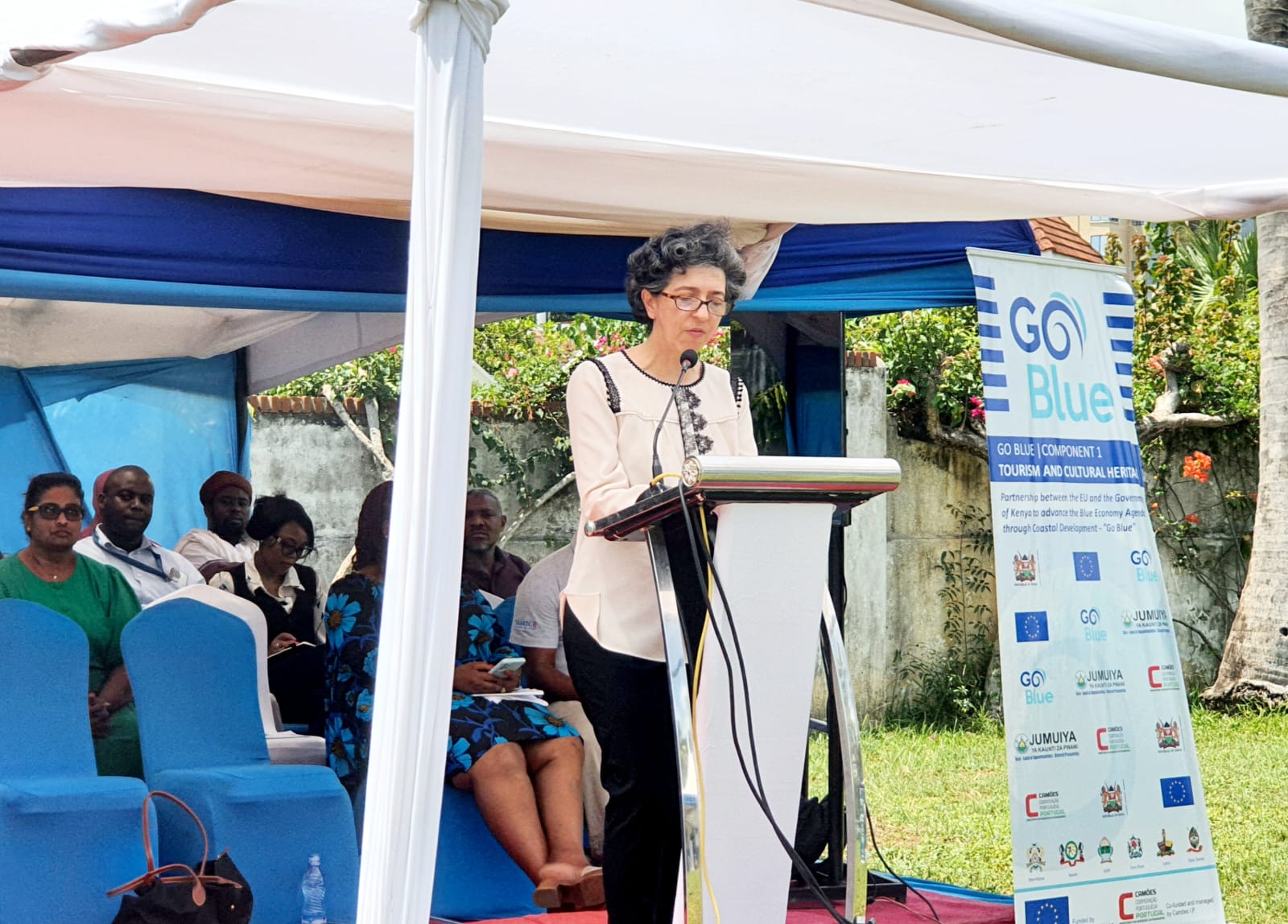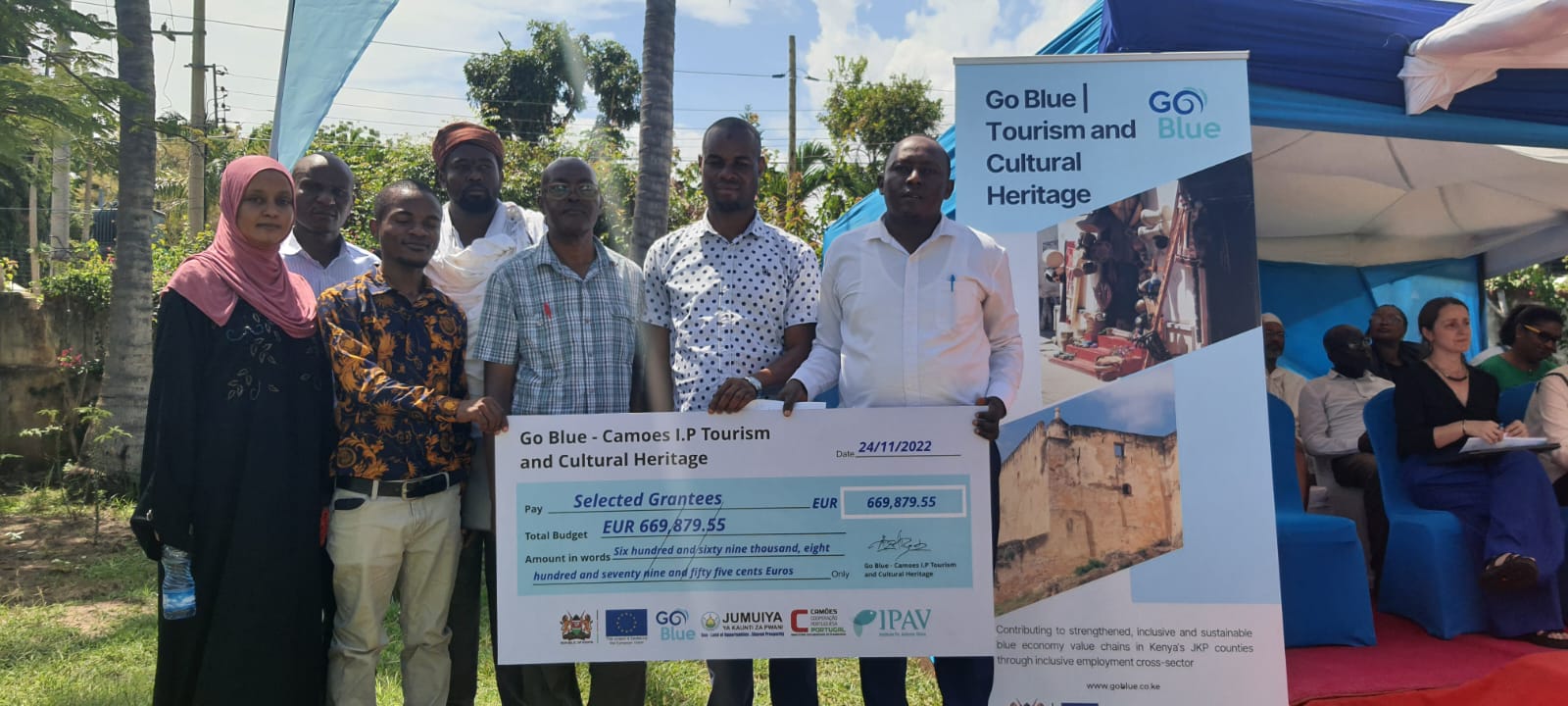
The official onboarding event of Go Blue’s Tourism and Cultural Heritage took place on 24 November 2022 at the Go Blue Offices in Nyali, Mombasa, graced the Ambassador of Portugal to Kenya, H.E. Amb. Ana Filomena Rocha. In attendance were county officials from the six coastal counties of Kenya where the Go Blue Project is being implemented, tourism and cultural heritage sector stakeholders, the TCH component action project beneficiaries, the TCH component Call for Proposal (CfP) awarded grantees, Jumuiya ya Kaunti za Pwani (JKP) secretariat and other implementing partners of the Go Blue Kenya project.

The overall objective of the 1-day onboarding event was to share knowledge and information on the TCH component of the Go Blue project with a specific purpose of creating awareness and inviting stakeholder interactions in contribution to the advancement of inclusive employment in Tourism and Cultural Heritage cross-sector in JKP Counties under its Jumuiya 2030 blue economy strategy.
Prior to the main event, the Portuguese ambassador to Kenya held a brief discussion with the county officials, the Go Blue advisor and the JKP CEO to deliberate on tourism and cultural heritage dynamics surrounding the Go Blue project, the challenges and potential solutions.
During her speech, H.E. Amb. Ana Filomena Rocha emphasised the value of investing in people, especially those in the tourism and cultural heritage sector, noting that it is a strong economic pillar in the coastal region. “Human capital can be the most valuable economic asset. This is why we believe that investing in people is the best way forward. Portugal, due to its strong links to the sea and rich historical patrimony, has made a choice to invest in the tourism sector. For that reason, we believe we can share our experiences and best practices and help others attain their potential” Amb. Rocha said.
She added that “the local communities would have much to gain with innovative investments in the tourism sector, taking advantage of the unique conditions of this region.”
The Go Blue Advisor, Mr. Ali Mwanzei demonstrated that tourism and cultural heritage, which falls under component 1 of Go Blue Growth of the Go Blue project, is significant as it creates opportunities for young people to be trained and equipped with entrepreneurship skills.
Through the Ubuntu Leadership Academy, 150 youth received training in multiple tourism and hospitality social entrepreneurship skills to find a job and/or create their own business.
While the TCH component strongly supports the skills development of young people, the segment target a wider group, including the tourism and cultural heritage practitioners across all six counties.
The project lead, Paula Vilela de Oliveira, during her presentation, applauded the coastal people for their dedication towards the preservation and promotion of cultural heritage. Ms. Vilela de Oliveira indicated that the TCH component seeks to mentor and train young people, increase the capacity of JKP, and conduct a value chains analysis study to facilitate the development of a tourism and cultural heritage blueprint.
The TCH component is being implemented by Camões I.P.
In addition, Ms. Vilela de Oliveira officially announced the results of the Call for Proposal, where 94 applications were received, out of which 17 were selected. The total budget is EUR 669,879.55, with over 80% going to non-profit projects.
About TCH Component
The Tourism and Cultural Heritage (TCH) Component of the Go Blue Kenya Project is aimed at supporting the achievement of the Go Blue Kenya project’s strategic objective of enhancing sustained, inclusive, and sustainable economic growth with job creation and employment impact.
A brief problem analysis of Kenya’s coastal tourism and cultural heritage development reveals challenges such as limited economic opportunities, persistent social inequalities, vulnerability to climate change, insecurity threats, rapid urbanization, rapid population growth and environmental degradation. Tourism, however, depends on ability to maintain rich biological diversity, overall environmental quality, reasonable urban security conditions and related favourable perceptions in national and international tourism advisories and demand.
In addressing these challenges, the Tourism and Culture Heritage Component, hopes to strengthen inclusive and sustainable blue economy value chains in the Jumuiya Counties and contribute to advance inclusive employment in Tourism and Cultural Heritage cross-sector in JKP Counties under its Jumuiya 2030 blue economy strategy as the specific objective.
In doing so, the Tourism and Cultural Heritage Component aims to create 100 Long-term new jobs, majorly targeting women and youth in the Tourism and Cultural Heritage sectors and generating EUR 550,000.00 of new investments advancing blue economy.
About Go Blue
The Go Blue Project is a result of collaboration between the EU and the Government of Kenya to advance the Blue Economy Agenda through Coastal Development. Development and implementation of the Go Blue project is a deliberate bottom-up partnership and inclusive organizational formation of the Kenya coastal communities, County Governments, the National Government of Kenya and the European Union.
Under the umbrella of the Blue Economy, the overall objective of the program is to unlock the potential of sea-land opportunities in coastal urban centre’s for sustained, inclusive, and sustainable economic growth with employment impact, while conserving and sustainably using the coastal and marine environment as well as promoting effective and integrated maritime governance.
The European Union-funded project is being implemented from 2021 to 2024 in the counties of Kwale, Kilifi, Mombasa, Taita Taveta, Tana River, and Lamu and the implementing partners include GIZ (Germany), AICS (Italy), Camões I.P. (Portugal) and Expertise France, UNEP/UN-Habitat UNEP with Jumuiya Ya County Za Pwani secretariat as the local partner.